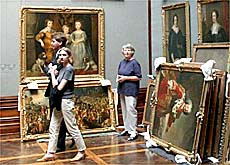Putting culture out of harm’s way

Swiss expertise in saving cultural treasures from natural and manmade disasters has been highlighted at an international conference in Bern.
The meeting comes just weeks after floods in central Europe revealed the need to improve protection of works of art.
In Prague, rising waters damaged priceless archives, while museums in eastern Germany were forced to take urgent measures to move paintings and other valuable items out of harm’s way.
The Swiss, who escaped the worst of the rains, were able to share their skills with neighbouring countries. Swiss museums sent specialist equipment to deal with water damage.
“It was an opportunity for our experts to implement their know-how,” said Karl Widmer, deputy director of the Federal Office for Civil Protection.
Eighty delegates from 70 countries are attending the three-day conference in the Swiss capital.
The meeting is focusing in particular on how civilian workers can improve the protection of cultural items.
Cultural protection
Switzerland is among the leaders when it comes to using civilian resources.
Following the recent reorganisation of the country’s civil protection services, a new strategy is being implemented which also involves the police forces and fire brigades.
A national committee is also reviewing the country’s inventory of cultural property.
“This doesn’t mean we’ll have more items on the inventory, because we are also reviewing the criteria that decide what is included,” Widmer told swissinfo.
The Swiss have little trouble understanding the need to protect cultural property.
More than a century ago, many historical sites were saved from demolition because the Swiss decided they were worth keeping.
Valuable objects
Even so, convincing everybody that a cultural object has real value can be difficult.
“Private citizens usually understand what has to be done,” said Widmer, “but when you deal with local authorities, it becomes more difficult. They usually hesitate because of financial concerns.”
The Swiss aren’t just concerned about their own culture though. Swiss diplomats are also working towards better protection of cultural objects abroad.
Diplomats say the destruction of the old Mostar bridge during the Balkan wars, or the demolition of the Bamiyan Buddhas in Afghanistan by the Taliban regime are just a few examples of why they have to intervene.
“Protecting cultural property is just one aspect of international humanitarian law, ” said Nicolas Michel, head of the Swiss foreign ministry’s international law division, “and we are focusing on the implementation of this law.”
Hague Convention
Switzerland is preparing to ratify the second protocol of the Hague Convention for the Protection of Cultural Property in the Event of Armed Conflict.
The protocol not only demands improved protection measures in peacetime, but also allows prosecution for the destruction of cultural property in the event of war, as well as protection during internal conflicts.
However, Michel admits that prosecution could prove difficult: “True implementation of the second protocol can only happen at a local level.”
This is where, according to Michel, Switzerland can play a role.
“We can supply expertise and financial support to encourage the protection of cultural property,” he said.
But is it reasonable to be concerned with protecting cultural objects when people in conflict zones or developing countries have pressing needs?
“We believe that you cannot let a person be cut off from his or her culture,” Michel told swissinfo. “It’s a part of someone’s life.”
swissinfo, Scott Capper
The second protocol of the Hague Convention improves the protection of cultural items.
Switzerland is promoting a stricter application of the protocol within the framework of international humanitarian law.

In compliance with the JTI standards
More: SWI swissinfo.ch certified by the Journalism Trust Initiative









You can find an overview of ongoing debates with our journalists here . Please join us!
If you want to start a conversation about a topic raised in this article or want to report factual errors, email us at english@swissinfo.ch.